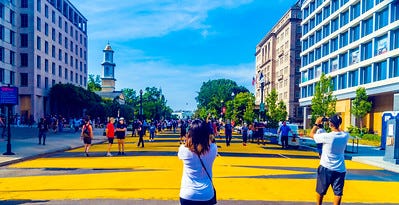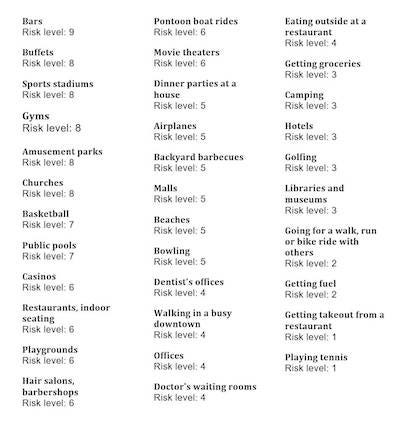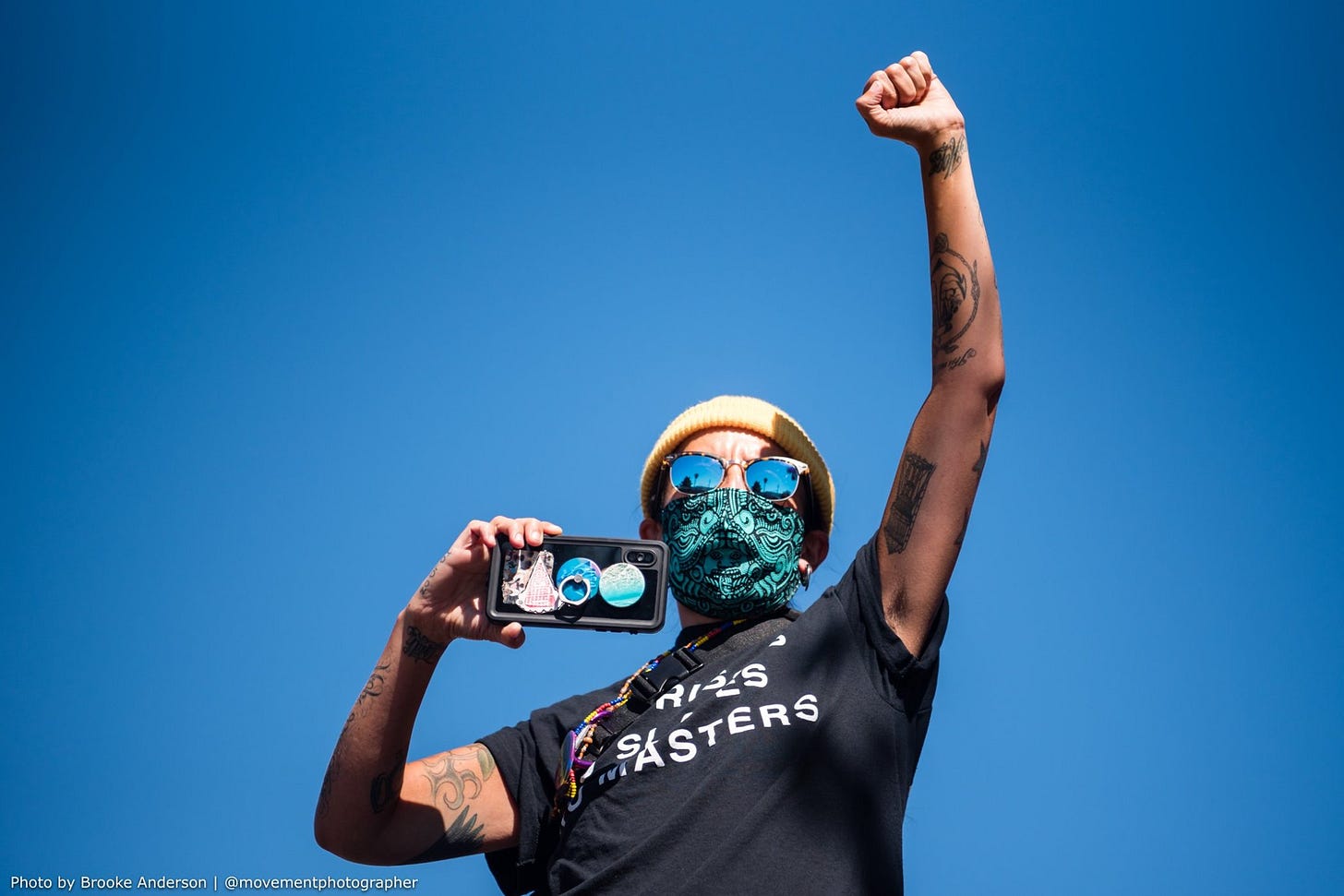
This week: A reflection on something personal and reflective. Like COVID-19. Or backing into herd immunity, by way of denial.
It’s been more than 90 days of shelter in place in Oakland, CA. Cases in Alameda County are rising, but much of our county is reopening. Our numbers are better than some cities, but cases are spiking none the less. The press is full of articles about how to assess risk, who to see, how to maintain a social bubble, what is most dangerous or most safe on a rating of 1 to 10?
We read them avidly, but none of them state the obvious: American is backing away from controls outside of herd immunity. Over the next six months to a year, COVID-19 is going to wind its way through our lives, hitting some people unexpectedly hard and taking out an unknown percentage of the elderly, the chronically ill, the working poor, and African-Americans who may be most susceptible to this disease.
Our response to this virus, as we go into month 4 of shelter in place, is turning into no response. For every person wearing a mask on the street, there are many others going bare-faced. And of course, there were important factors that made going out in large groups of people into a critical need.
Honestly, it feels like dealing with the virus just isn’t a priority.
We have no federal guidelines about wearing a mask or staying home. State by state directives vary widely. The decision about what guidelines to follow and how to behave is 100% left to the individual. Faced with a bewildering array of conflicting messages, we end up all too often treating the threat of getting sick from or infecting someone with COIVD-19, with the same optimistic procrastination with which we plan to diet, reaching for that pizza or slice of cake now with the conviction we will do better and pass it up tomorrow.
Aren’t the parents who let their pre-teen children mingle with their cheerleading team, their baseball team, their family at the grandparents’ pool and the kids across the street, all the while feeling they are maintaining their social bubble, operating with the same degree of denial so many people in America have right now? The neighbors who all gather every night 6 feet apart, supposedly, but with no masks? The people gather with friends they don’t live with outside somewhere windy, so they feel they don’t really need a mask, and the ones who have masks but don’t wear them, or pull them down below their nose, or think that if I get sick it’s God’s will or the President doesn’t wear them, so why would I?
Our culture of individualism makes it easy for us to each set our own behavior standards, but when it comes to setting them to protect others from this virus, we’re failing.
The hard part here isn’t the range of choices we all have about our behavior. It’s the unspoken disregard of the risks our behaviors have on others. Many Americans who do not see themselves as at risk have decided not to care about those who do--especially if those at risk are elderly, frail, low-income, a service worker, or a person of color.
The way we are backing into herd immunity, rather than taking consistent precautions, is a reflection of many people believing “It just isn’t my problem.”
I understand that it is easy to let fear dictate behavior and that we all exist on a spectrum of choices about risk. However, much of the behavior in our country shows that we have made a decision to manage the virus on a reactive, not a proactive basis. We want to take enough precautions so that emergency rooms aren’t flooded with critically ill patients who need ventilators, but if we can keep the hospitals relatively clear, we can open up more, at least until cases start to rise again.
I am a part of this same Devil’s bargain, just like almost everyone.
I am planning how often to go into work, and how much to stay home, and considering whether I am willing to do more socially distanced activities (masked) outside with friends, take an overnight trip, or spend sustained time with my adult child who has a fairly large pod of family as friends.
But I am concerned with how little people are naming these choices.
As an older person who lives in a state--a county-- a city--with a rising number of cases--it feels like we’re all making an unspoken decision to accept more losses, more illnesses, more deaths--Because doing anything else besides that just isn’t in the DNA of our culture and our government.
America’s original motto may be “Give me liberty or give me death,” but it feels like the current version of that is really “This virus is just so f*ing inconvenient, I am done.”
And as we see cases rise in the coming week as a reaction to mass exposures at protests and beaches, all too many of those not affected will shrug, thinking, but not saying “I’m so glad it’s not me.”
We are backing into herd immunity, by way of denial, and it is maddening, and it just sucks.
Related reads: Down the herd immunity rabbit hole
The rage of watching everyone I know quarantine as someone with chronic illness, by Sarah Murphy, The Mighty
Coronavirus divide: I'm staying home, being cautious and feeling judged by friends, by Melinda Henneberger, USA Today
America is giving up on the pandemic, The Atlantic
The World Is Still Far From Herd Immunity for Coronavirus, The Upshot, New York Times,
No federal mandate for face masks, state by state guidelines, CNN
Another rating of risks going out, by doctors in Michigan, MLive


Quick takes: I went back to Twitter after 2 years away. I am loving it as a brilliant river of reflective voices, more immediate and fresh (although in some cases just as knowing and polished)than any mainstream media. I found some posts there that made me sit in discomfort, the place I need to be.
A (food media) resignation letter, by Oysai Endolyn. The hard and uncomfortable truths of this letter are brilliantly articulated as a map of white privilege and of apologies long overdue.
It’s Time to Bring Out the Good China, by Sherrell Dorsey, from her new newsletter, MS-DOS and Tupac. The message: Moving toward equity actually means sharing opportunities you might not want to give up.
“The good china costs a lot more. It means stepping down from the table and offering a seat to the person who has not yet had the chance to eat.
If you aren’t planning to feed us, don’t invite us over for dinner. “
Food Media Failures, by Abigal Koffler, from this needs hot sauce. Food media isn’t the only media—or employment sector—built from systemic racism and othering, but there was a lot of powerful naming and action this week, and Koffler shares its impact on her thoughts.

You made it this far, so here is one more thing:
How We Can Win: Kimberly Jones Full-Length Video: Ms. Jones breaks it down about race and class issues that don’t get named enough, especially where white people can listen and learn. Must watch. If you are a white person and have fellow white people saying things like “But why were people looting? I can understand a nice peaceful, quiet demonstration but this…,” this video could expand their thinking, as it did mine. Pass it along.
Have a great week! Send me some feedback (susanmernit@gmail.com) and think about what actions you are taking to keep the values and momentum of #JusticeforGeorgeFloyd in your life.
Best, Susan
CONTRIBUTING WRITERS--Maybe you?
Who are the friends and readers who might like to contribute occasional posts to Cover Your Bases? If you’d be interested in contributing occasionally (and there is a loose format and guidelines I’d share with you), please drop me a line with some ideas and possible timing (soon, later, very much later). I have ideas about posts friends and colleagues might contribute, and maybe you do, too.
Thanks for reading #4. #5 hits next Sunday. Subscribe if you like it. And tell your friends. I’d love more readers.


